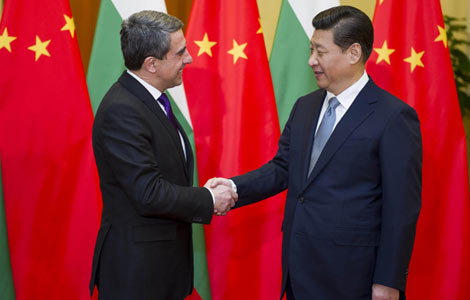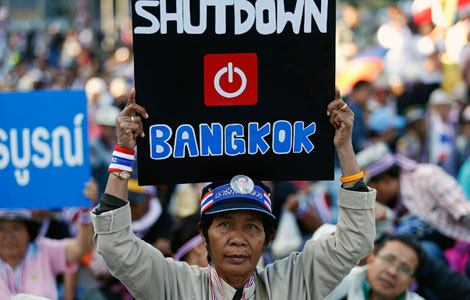US Congress rejects Obama's funding plan for IMF
Updated: 2014-01-15 11:24
(Xinhua)
|
||||||||
WASHINGTON -- The US Treasury Department said Tuesday it was disappointed by Congress' failure to include a plan that would help the International Monetary Fund (IMF) carry out its quota and governance reform package.
"We are disappointed that Congress failed to include the 2010 quota and governance reforms in the current legislation," said Holly Shulman, a spokeswoman of the Treasury Department in an email to Xinhua. "The United States remains committed to implementing the 2010 quota and governance reforms, and we are examining options to do so as soon as possible."
US Congress on Monday ignored President Barack Obama's 2010 funding plan for IMF. Since United States is the IMF's largest shareholder and veto power, its rejection of the funding plan could leave the 188-nation group without additional resources and blocks an increase in voting power for China and other emerging markets.
Christine Lagarde, Managing Director of the IMF, also expressed her disappointment. "We understand that the US administration will continue to work on securing the necessary legislative authorization, and we are hopeful that this will happen."
The IMF Board of Governors approved a quota and governance reform package on December 15, 2010. The reform package included a doubling of IMF quotas and a shift in quotas to dynamic emerging markets and under-represented countries. It also proposed an amendment to reform the executive board that would facilitate a move to a more representative and all-elected executive board.
The IMF previously had intended to make the 2010 reform package effective before October 2012, but the U.S. Congress has become the major stumbling block for the reform.
Although the plan would not require any new financial support from the United States and will retain its position as the largest shareholder, members of U.S. Congress insisted the 63-billion-U.S. dollar shift plan is no small matter.
The Treasury Department said the U.S. commitment to the IMF are critical to preserving the United States'leadership and influence. It also underscored that the IMF is critically important to U.S. economic and national security interests. As the world's first responder to financial crisis, the IMF protects the U.S. recovery and promotes America's strategic interests abroad, while supporting U.S.jobs, exports, and financial markets.

 Detroit auto show features fuel-efficient cars
Detroit auto show features fuel-efficient cars
 Palestinian students show military skills
Palestinian students show military skills
 Cristiano Ronaldo wins FIFA best player award
Cristiano Ronaldo wins FIFA best player award
 Xuelong carries on mission after breaking from floes
Xuelong carries on mission after breaking from floes
 Beijing and Sofia vow new initiatives
Beijing and Sofia vow new initiatives
 71st Golden Globe Awards
71st Golden Globe Awards
 Bangkok unrest hurts major projects and tourism industry
Bangkok unrest hurts major projects and tourism industry
 No pant for cold subway ride
No pant for cold subway ride
Most Viewed
Editor's Picks

|

|

|

|

|

|
Today's Top News
Air China ups Houston-Beijing service to daily
Two students hurt in New Mexico school shooting
Chinese have new friend for US tours
15 flu-related deaths reported in Arkansas, US
New workstation in Silicon Valley
At least 16 dead in E China factory fire
Xi calls for reform to fight graft
S. China Sea rules no threat to peace
US Weekly

|

|







